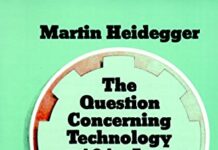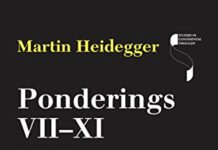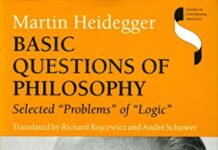
Ebook Info
- Published: 2000
- Number of pages: 424 pages
- Format: PDF
- File Size: 24.41 MB
- Authors: Martin Heidegger
Description
“[Heidegger’s] greatest work . . . essential for all collections.” ―Choice” . . . students of Heidegger will surely find this book indispensable.” ―Library JournalContributions to Philosophy (From Enowning), written in 1936-38 and first published in 1989 as Beiträge zur Philosophie (Vom Ereignis), is Heidegger’s most ground-breaking work after the publication of Being and Time in 1927. If Being and Time is perceived as undermining modern metaphysics, Contributions undertakes to reshape the very project of thinking.
User’s Reviews
Editorial Reviews: From Library Journal Considered by scholars to be Heidegger’s most important work after Being and Time, this book was written during the 1930s but did not become available to the public until 1989. (This is the first translation from the German.) Here Heidegger attempts to carry out what he calls “being-historical thinking.” Since the way in which “being” discloses itself throughout history varies, he sees his task as describing the key moments of the process. As usual, Heidegger’s analysis proceeds from careful attention to the origins of philosophical terms. He writes in an aphoristic style and often employs new and strange words, but students of Heidegger will surely find this book indispensable.-David Gordon, Bowling Green State Univ., OH Copyright 2000 Reed Business Information, Inc. Review “Publication of this volume is the most important event in Heidegger scholarship in English since the 1962 publication of the first English translation of Sein und Zeit. Although a new translation of Being and Time has appeared (CH, Mar’97), it is difficult to imagine that this inventive and highly readable translation of Beiträge (Beitrage) zur Philosophie (vom Ereignis), by Emad (emer., DePaul Univ.) and Maly (Univ. of Wisconsin―LaCrosse), will ever be superseded. Indeed, Being and Time appears almost conventional in light of the global transformation of ordinary language that characterizes Contributions to Philosophy. Emad and Maly acknowledge that the German original itself is not readily accessible to German readers. Since the 1989 posthumous publication of the Beiträge (Beitrage) , the relation of this 1936―38 manuscript to Heidegger’s thinking has become a major topic. Contributions is about the turn toward Seyn (be―ing―the archaic spelling of Sein―being), which implies a turn toward the resistant enigma of another origin. The major decisions in this translation (e.g., Ereignis as enowning instead of appropriation; Wesung as swaying instead of essencing) make Heidegger’s thinking more accessible to English speakers. This translation will contribute greatly to establishing Contributions as Heidegger’s second masterpiece and his greatest work. Essential for all collections. General readers; upper―division undergraduates and above.July 2000″ (N. Lukacher University of Illinois at Chicago)”[T]he new Contributions to Philosophy is an impressive achievement. The vast majority of passages are no more opaque than the original, most of the translators’ choices are very defensible, and the helpful appendices include German, Greek, and Latin glossaries as well as a bibliography of other writings by Heidegger to which he refers in this text.” (Notre Dame Philosophical Reviews) About the Author Parvis Emad is Emeritus Professor of Philosophy at DePaul University and the founding coeditor (with Kenneth Maly) of Heidegger Studies. With Kenneth Maly he has translated Hegel’s Phenomenology of Spirit and Phenomenological Interpretation of Kant’s Critique of Pure Reason by Martin Heidegger and Encounters with Martin Heidegger by Heinrich Wiegand Petzet.Kenneth Maly is Professor of Philosophy at the University of Wisconsin-La Crosse and coeditor (with John Sallis) of Heraclitean Fragments. Read more
Reviews from Amazon users which were colected at the time this book was published on the website:
⭐Contributions to Philosophy is, in my opinion, Heidegger’s most important work. It is not nearly as accessible as Being and Time (and to speak of Being and Time as in any way accessible will sound ridiculous to many) but compared to Contributions, Being and Time is a model of clarity. The difficulty of the text is not made any easier by this particular translation. In fact, it is made much more difficult. The translators of this work decided to invent English neologisms for many of the most important words that Heidegger uses which are not neologisms in German. In other words, the German reader reading this text will be encountering ordinary German words, albeit used in a different way, but still understandable to some degree in terms of their ordinary connotations. The English words that Parvis Emad and Kenneth Maly use to translate those words are entirely made up. This makes the text virtually unintelligible in places. It is not unlike someone who simply decided to invent their own language and then went around and expected people to be able to understand what they were saying. There is a new translation on the way so if you are not in any immediate hurry to read this book it might be worthwhile waiting for the new translation:
⭐.If you are in a hurry it is certainly possible to make sense out of this translation. The book is not impossible, it does not quite degenerate into total non-sense, but the task of interpreting is made extremely difficult. It is for that reason that a companion to this text is absolutely essential. In my opinion the best choice is
⭐by Richard Polt. Richard Polt does a fantastic job of making the Contributions accessible and philosophically exciting.
⭐by Daniela Vallega-Neu is also quite good but not quite as accessible as Polt. And while I have only read a couple of the essays in the collection
⭐seems like a decent companion as well. Another very interesting book that deals with the Contributions is
⭐by Miguel de Beistegui. Beistegui’s interpretation is, in my opinion, not an entirely faithful interpretation, and it is not clear that Beistegui intended it as such, but it is an extremely interesting reading of the Contributions nevertheless (actually only the first half is about the Contributions, the second half is about Deleuze).Contributions is really an amazing book. It is not really possible to offer a summary of this work. It really has to be read and it has to be read in the light of Heidegger’s other writings. It is particularly important to have read
⭐and
⭐before reading this book. It would also be very helpful to have read Heidegger’s essay The Question Concerning Technology. Contributions develops themes from all of those works. It develops the notion of Dasein from Being and Time and offers a fundamentally new interpretation. It develops the notion of the oblivion of being from Introduction to Metaphysics and it develops the notion of machination from the essay on technology. The goal of the work is to get human beings to make the leap into Da-sein, the site where it is possible to make a decision about be-ing, and open up the possibility of a transition between the first and the other beginning. This will sound unintelligible to those who have not read this book and to fully explain what all of this means would require a degree of unpacking that is not really possible in an amazon review but if you have the patience, and you have a good companion (like the Polt book) it is certainly possible to unpack that statement, and when you do you will find a vast field of philosophical riches waiting for you.All I can really say is that this book is absolutely essential for anyone interested in Heidegger. It is impossible, in my opinion, to get a sense of Heidegger’s entire project without reading this book. If you focus on Being and Time you will wind up thinking that Heidegger was an existentialist primarily concerned with reinterpreting the being of human beings. That was basically my interpretation of Heidegger for a number of years but reading Contributions (along with some of Heidegger’s other essays) changed that. The book is difficult but it is worth the effort. If you have some understanding of the other Heidegger works I mentioned you should definitely pick up Polt’s book and start patiently making your way through this book. Actually it does not have to be read in order and I think the section on Grounding is really the central section so you might consider starting there which is actually what I did. Good luck!
⭐I have only begun to study this book, but I bring to it 35 years of living with awareness of Heidegger’s work and struggling with many of his texts. So far it seems to me that this work is a struggle to do what he confessed he could not do–overcome metaphysics or cross-over to a second beginning.My German is so primitive that I could never read this text in its original language. I see that saves me from feeling a need to compete with this translation. I am thankful for small blessings. The unique poetic vocabulary invented by H to avoid metaphysics and promote the cross-over presents a challenge.The unique vocabulary by Emad and Maly means I must not depend on solitary words, even while H is at such pains to set them in context. (On continued study of this book, I am increasingly admiring of the translation, with the picyune exception of the use of English words with “-ness” and “-hood” that typically shout *metaphysics.*)As with Sein und Zeit which I first read about 30 years ago and then reread 5 years ago, I can only resort to a developing appreciation of this volume. It is hard work for me.Yet I should not want to die without even a meager acquaintance, as mine is, with our age’s version of Aristotle. Even he was libeled for political incompetence. Opportunities such as are offered in this volume do not come around everyday.Upon beginning the reading I would have been satisfied to call what I found a Heidegger “worldview;” that is, avoidance of philosophy as erudition. Yet early on H makes clear it is philosophy he is doing, because philosophy, contrary to worldview, calls itself into question. That thread is built around H’s sense of our distress and a need to accept it. Is that an answer as found in metaphysics and worldviews? Only if it is an unsettled settlement, a willingness to stay on a path with no end in view.AddendumHerrmann, the editor, tells us that he moved what began as the second of the eight joinings (not chapters) of the text, “Be-ing,” to the very end in accord with a note by Heidegger. Overwhelmed by the volume, I have now concentrated study on that final section which H’s note characterized as “an attempt to grasp the whole once again.” I do find that reading and rereading it does help my understanding; maybe even enough so that one day I can return to the other sections. That is, if I am able to recover my balance from the stunning assertions now coming through.A Reader’s Digest or Cliff Notes version might go something like this: Although the ancient Greeks alerted us long ago to the differentiation between a being or beings and be-ing as such, from Anaximander to Nietzsche (the last great philosopher) be-ing as such has only been understood on the basis of a being or beings. As a consequence, it does not bother us that being as such is treated as most-being or being in general. It ought to bother us a lot, for all the confusion it has caused and for the emptiness it has left us with.Whenever it was we came to realize that we are mortals and that we can predict our inevitable end-of-life, we also were offered the opportunity to realize ourselves as historical. That is, we come to realize that as there was something here before we got here (rendering us as thrown) there will also be something after we are gone. How does it happen that we so seldom wonder about that amazing state of affairs? Or wonder about it at least as much or more than we wonder about what things, entities, objects, beings are made of? That blind spot is what ought to bother us.Maybe we still have a chance to recover from our neglect. We have hints of another beginning to philosophy scattered in both the triumphs and the failures of Western thinking. In addition, we have the phenomenon of language, with all its possibilities. If we think of language as a gift to us, maybe even a gift from be-ing as such, we might reassess our place. We then could think of ourselves as granted that gift of language in order to be guardians of be-ing as such. And then we could see ourselves as participants in “the sway of be-ing,” which is a kind of destiny, our destiny and our truth. If nothing else, our lives then can be richer in contingencies.The hardest part is being silent enough to hear what, if anything, be-ing has to say to us. Our history back to most ancient times is seeking for ground when abground is t/here. We account for it by naming it “nothing,” but that misses it. (ed. note: Sartre’s mistake?) The poets enable us to hear the message of the gods, even while they are few who can bear to listen.My study of section “VIII. Be-ing,” has steadily increased my appreciation for a feature that drew me to Heidegger originally: his insistence and capacity for coherence. His task is both to account for how we have arrived at our ontological predicament and then to offer hints of further possibilities. It is his welcoming of “possibility” that currently most intrigues, as ordinary philosophy gives little weight to the concept.His innovative vocabulary mimics what must have been his experience studying the Attic Greeks where meaning only emerges in a context of otherwise undefined words. Heidegger’s new concepts depend on the whole context of his work. Innovative vocabulary is the task he assigns to poiesis, and its measure is the horizon of our understanding. We can think only as far as our concepts will take us.
⭐OK
⭐It is unbelievable Indiana Press let this translation become a book.
Keywords
Free Download Contributions to Philosophy (From Enowning) (Studies in Continental Thought) in PDF format
Contributions to Philosophy (From Enowning) (Studies in Continental Thought) PDF Free Download
Download Contributions to Philosophy (From Enowning) (Studies in Continental Thought) 2000 PDF Free
Contributions to Philosophy (From Enowning) (Studies in Continental Thought) 2000 PDF Free Download
Download Contributions to Philosophy (From Enowning) (Studies in Continental Thought) PDF
Free Download Ebook Contributions to Philosophy (From Enowning) (Studies in Continental Thought)




